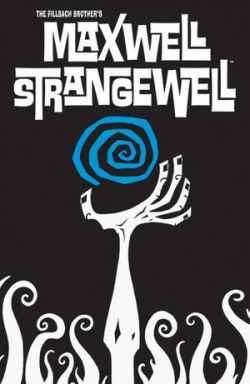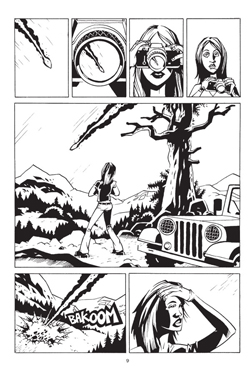- Comics
- Comics Reviews
- Manga
- Comics Reviews
- European Comics
- News
- Comics News
- Press Releases
- Columns
- Spotlight
- Digital Comics
- Webcomics
- Cult Favorite
- Back Issues
- Webcomics
- Movies
- Toys
- Store
- More
- About
By Al Kratina
August 5, 2007 - 19:34
 |
Graphic novel
Dark Horse Comics
Writer: Matt Fillbach, Shawn Fillbach
Artist: Matt Fillbach, Shawn Fillbach
The Fillbach brothers have apparently learned quite a bit from their stint on the Star Wars: Clone Wars Adventures comics. In Maxwell Strangewell, their graphic novel from Dark Horse Comics, they’ve created a universe well populated with a vast array of bizarre creatures and anchored by a new-age spirituality that, mixed with the sci-fi geekiness, creates the perfect nerd hybrid. If the book catches on, it’s destined to be discussed in the context of futuristic utopias alongside Gene Rodenberry, J. Michael Straczynski and the guy who invented World Of Warcraft. Not that WOW is particularly utopian, it’s just that sci-fi is a geek genre, and most geeks’ idea of a perfect world involves defecating in adult diapers while playing MMOPRGs for 48 straight hours.
Sorry, that was a bit out of line. But I just came back from the San Diego Comic-Con, and the ordeal of trying to force my way past a gaming table in order to get in line for an ugly and obnoxiously coloured
Superman Vs. Doomsday mesh bag has filled me with loathing for both myself and for the geek culture I represent. Moving on, however, reveals that
Maxwell Strangewell, though it may only be appreciated by a niche comic book audience, is both well constructed and well conceived. Built on the classic story-telling paradigms of “stranger in a strange land” and “the visitor who changes everything”, the book begins when a large fellow who looks like a cross between Lurch and Gary Busey lands on Earth. Discovered by photographer Anna Gilmour, the strange fellow mind-melds with her, and Gilmour, the stranger, and the Earth are soon besieged by alien races both good and evil. In the first stages of the story, it seems as if the Fillbach brothers, who share writing and illustrating credits, may have bitten off more than they can chew, but things eventually come together, especially with the addition of comic relief character Lobscrum. By the end, the new-agey spirituality replaces the action, which is somewhat anti-climactic, but it’s a satisfying read nonetheless.

The art is black and white, and deceptively simple. It’s got a distinctly humorous touch, and the black and white is used well, occasionally evoking Frank Miller with less of a crushing sense of gravitas. Two of the characters occasionally blur together, especially as they become more grizzled, but for the most part everyone else is distinct and visually interesting. The page layouts are fairly straightforward and geometric, and none of the perspectives or angles stand out, but the story-telling is clear, and the art provides a strong backbone for the story. Gene Roddenbery and the Horde would be proud.
Rating: 7 on 10